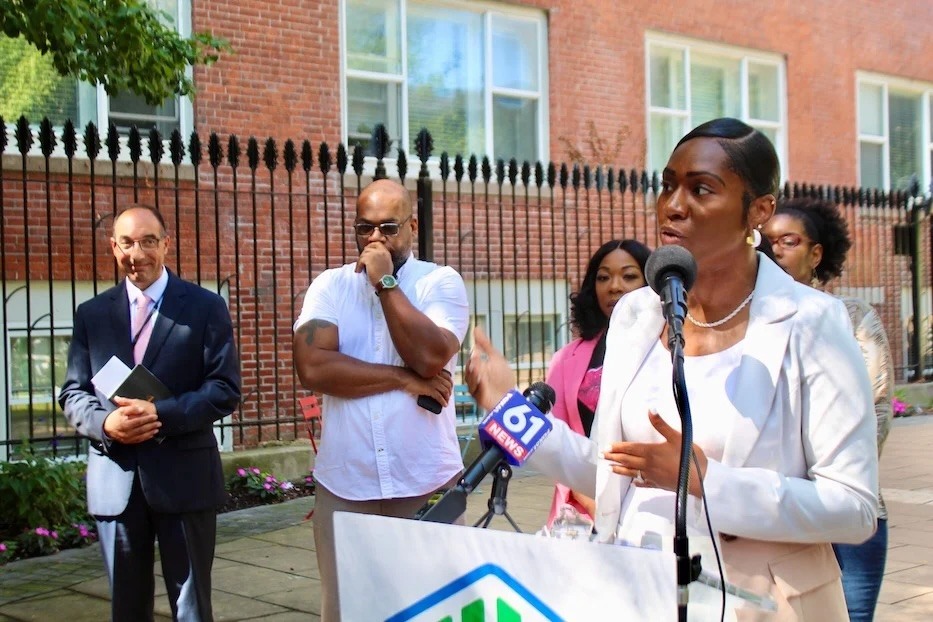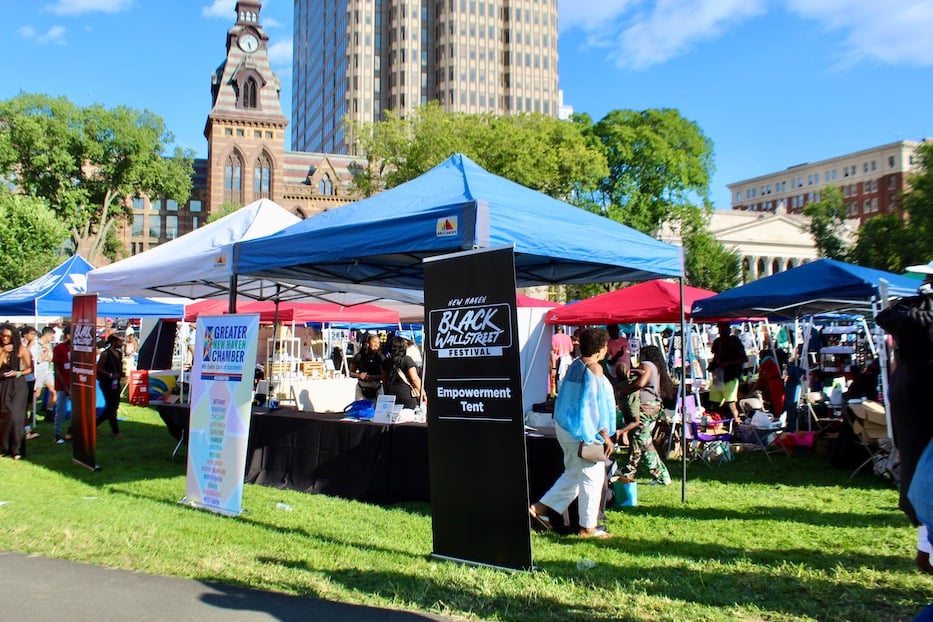
Culture & Community | Politics | Arts & Culture | Elicker Administration | Arts & Anti-racism

Adriane Jefferson: "The work we have done together will continue on, and I will always carry this city’s spirit with me. This is not a goodbye—it is a celebration of all we have accomplished and all that is still to come." Lucy Gellman File Photo.
A citywide champion of cultural equity is heading to Atlanta this month—and hoping to bring what she has learned and implemented in New Haven with her on her journey South.
That champion is Adriane Jefferson, whom Atlanta Mayor Andre Dickens has tapped to lead the city's Office of Cultural Affairs starting at the end of the month. For the past five years, Jefferson has steered New Haven's Department of Arts, Culture and Tourism through massive changes, including a global pandemic and a sustained, public commitment to cultural equity.
In that time, she has also become the New Haven liaison for the Government Alliance of Race and Equity and gained national recognition from Americans for the Arts.
“To the people of New Haven—This city has been my home, my heart, and a place where I’ve been deeply committed to building community and creating spaces that uplift, empower, and celebrate culture. As I prepare to step into a new role as Executive Director of the Atlanta Mayor’s Office of Cultural Affairs, I do so with immense gratitude for the love, support, and collaboration that New Haven has given me,” she wrote by text message Monday evening.
“Serving this city has been one of the greatest honors of my life,” she continued. “From the groundbreaking programs we built together to the powerful conversations that shaped our cultural landscape, to revolutionary movements and culture shifts we have created, every moment has been rooted in a shared commitment to justice, equity, and artistic excellence. New Haven is a city of brilliance and resilience and I have been blessed to witness firsthand the transformative power of our artists, activists, and community leaders.”
She leaves massive municipal shoes to fill. Jefferson began her tenure in New Haven in February 2020, just a month into Mayor Justin Elicker’s first term and a month before the Covid-19 pandemic began. Prior to her time in the city, she served as a program officer for the Connecticut Office of the Arts, where she spearheaded its READI (Relevance, Equity, Access, Diversity and Inclusion) framework and now-robust Arts Workforce Initiative. In New Haven, she hit the ground running, sketching out her vision for cultural equity at what would turn out to be the last in-person meeting of the city’s Cultural Affairs Commission for years.

Juan Castillo in the WYBC studio as part of "Mask Up," a 2020 multi-media campaign that the department supported. Lucy Gellman File Photo.
When Covid-19 hit New Haven, Jefferson pivoted in a number of days. By late March, she had helped the city launch #TogetherNewHaven, a virtual campaign that urged New Haveners to support each other in a time of isolation. She poured city resources into the New Haven Creative Sector Relief Fund, working with the Arts Council of Greater New Haven to get artists financial support as work disappeared overnight. As new data emerged around how to contain the virus, she partnered with artists and local influencers on the city’s “Mask Up” campaign. It later became a template for two 2021 citywide campaigns, both aimed at vaccination.
At the same time, she reminded New Haveners that arts were—and continue to be—a catalyst for social change. Following the state-sanctioned murder of George Floyd, the department rolled out an Arts For Anti-Racism pledge and toolkit that city leaders, arts organizations, and institutions could sign on to. It collaborated with Town Green Special Services District and artist Isaac Bloodworth to get an image of Black Kid Joy on City Hall, wrapped brightly around Ed Hamilton’s Amistad Memorial in a meeting of past and present. In the fall, the department worked with Black Lives Matter New Haven to install two new, large-scale murals in Newhallville and Downtown.
She championed federal funding for arts organizations, from theaters to restaurants. She built new programs intended to throw artists a pandemic life preserver at a time when they were increasingly economically desperate. She showed up at community paint days and press conferences and unveilings. It seemed that she was constantly in motion.
When arts programming remained remote in early 2021—her one-year anniversary with the city—she launched Unapologetically Radical, a one-day virtual conference “created to address, amplify and activate anti-racism in arts and culture.” She oversaw cultural programming that grew out of federal relief, including a $1 million slice of a $6.3 million “Summer Reset.” With the city’s Economic Development Administration, she attended Civic Space sessions, making sure the arts were at the table as New Haveners talked about the allocation of American Rescue Plan Act dollars.

Jefferson at the release of the city's Cultural Equity Plan, the first in the state, in January 2022.
Meanwhile, Jefferson continued to build towards a cultural equity plan, working with the New York-based firm Hester Street, New Haven's Civic Impact Lab, and a co-creation team of artists to make it a reality. On a sun-soaked day in January 2022, she unveiled it at the Dixwell Community Q House, making New Haven the first city in the state with a plan. That spring, she kicked off the first leg of a “Cultural Equity Tour,” speaking virtually with local arts leaders.
"I feel immense gratitude, because for Adriane—she's such an impactful, innovative trendsetter," said Arts Council Board Vice President Sha McAllister, who worked on the plan's co-creation team in 2021. "Everything she's brought the city through, it's just been monumental. No one would have thought New Haven would have had a cultural equity plan.
“We’ve gained so much ... I think it's pure genius,” she added, calling Jefferson a generous and selfless mentor. “And with such poise, grace and respect. She's never made it about her. It's always been about New Haven. I know God's gonna keep his hands over her, and I just feel so blessed."
"What Adriane has done in the city has been nothing short of equity, innovation, renaissance," said Black Haven Founder Salwa Abdussabur, who also served on the plan's co-creation team and has marveled at the Cultural Equity Plan as a young arts leader herself. "She really took what was happening in New Haven and opened doors … she welcomed the community in a way that I've never seen the city do.”
“The cultural equity plan is essentially her blueprint,” Abdussabur added. “She said, 'Hey, I want the community to create and cultivate this.' I think that's quite powerful. It's not only a blueprint for generations to come, but also I feel like it's part of me."
As she and the department implemented the plan across the city, Jefferson also kept experimenting and extending support, from celebrations of Black brewers to BIPOC music festivals to a beer garden that ultimately popped up downtown. When the Arts Council of Greater New Haven received $100,000 from the National Endowment for the Arts in 2022, the department launched New Haven’s inaugural Creative Workforce Initiative, a partnership through which adults landed at paying internship sites as a path to professional development.

Black Wall Street in 2023, as it moved onto the New Haven Green.
With a $1.2 million tranche of federal American Rescue Plan Act (ARPA) dollars allocated by the city's Board of Alders that year, she also brought on artist Thabisa Rich, awarding hundreds of thousands of dollars to artists and organizations dedicated to cultural equity and an arts landscape that was as diverse and polyphonic as the city itself. With collaborators like The Breed Ent., she launched the city’s first Black Wall Street, which has since grown into a week-long festival and celebration of Black artists and entrepreneurs on the New Haven Green.
Along the way—and often operating with a relatively small budget—Jefferson has never worked in a silo: she’s quick to shout out her colleagues and collaborators at the city’s Economic Development Administration and Department of Arts, Culture and Tourism, particularly longtime city official Kim Futrell. Futrell, who for 24 years served as the department’s community outreach coordinator, is now the acting director of the Department of Arts, Culture and Tourism. Prior to Jefferson’s announcement Monday, she was named deputy director last September.
In a meeting of the Cultural Affairs Commission Monday, several attendees expressed their appreciation for Jefferson. In her five years at the city, the all-volunteer group—which is meant to help the department facilitate and get the word out about grants and events—has changed tremendously, with a number of new commissioners who reflect the kaleidoscopic diversity of the city they call home. All commissioners are appointed by the mayor.
“She really has left her handprint on everything in New Haven,” said Magaly Cajigas, who chairs the commission and serves as the Connecticut State Director of the Hispanic Federation. While she’s sad that Jefferson is leaving, she said she’s also excited for her next chapter in Atlanta.
“I have seen the transition from what it [the department] was to what it is,” added commissioner Rebekah Moore, a lifelong New Havener who now serves as the program director at the Arts Council of Greater New Haven.

Lucy Gellman File Photo.
Tuesday afternoon, Mayor Justin Elicker called Jefferson's departure "a bittersweet moment for New Haven." In 2020, she was one of his first mayoral appointees, and is often one of the first people he credits for an arts landscape that is constantly evolving.
“While we celebrate Adriane's remarkable new opportunity, we will deeply miss her as a colleague and her incredible leadership in our arts and cultural communities," he said. "Through her efforts, the city developed its first-ever New Haven’s Cultural Equity Plan, established the city’s first Black Wall Street Festival, and supported dozens of arts organizations and programming through our Neighborhood Cultural Vitality grants. New Haven is the cultural capital of Connecticut and has become a cultural destination beyond our state’s borders – and Adriane’s work during her time here will leave a lasting impact on our community.”
In a release from his office Monday afternoon, Dinkins expressed excitement for Jefferson's appointment and upcoming tenure. In Atlanta, Jefferson will supervise a department that has over two dozen employees working across city services. Atlanta, unlike New Haven, is also a city that robustly funds the arts: last year, the Office of Cultural Affairs had a $4.4 million operating and $5 million capital budget, according to city documents. In New Haven, the department’s budget is around $350,000. She takes over for Camille Russell Love, who announced her retirement last May.
“Atlanta’s arts and culture are deeply woven into the fabric of our community, reflecting creativity, diversity, progress and authenticity,” Dickens said in a press release Monday afternoon. “Adriane Jefferson is the transformative leader we need to amplify our cultural presence and further our commitment to fostering a city where art and equity thrive together. We are thrilled to welcome her to Atlanta and continue building on our rich legacy of artistic excellence and cultural inclusion for generations to come.”
Jefferson, meanwhile, took a moment to remind New Haveners that this isn’t a final farewell, but a transition. She will always have an eye on the city.
“Though I may be stepping into a new chapter, my love for New Haven remains unwavering,” she wrote in a text message Monday. “The work we have done together will continue on, and I will always carry this city’s spirit with me. This is not a goodbye—it is a celebration of all we have accomplished and all that is still to come.”
Note: Some of this article comes from a previous piece in the Arts Paper, fêting Jefferson's win of the American Express Emerging Leader Award from Americans for the Arts in 2022. Read that here.

